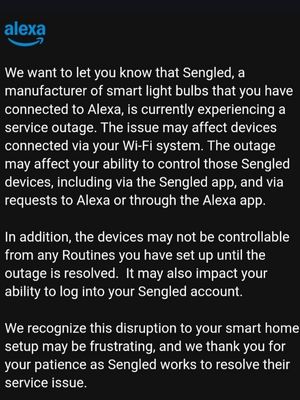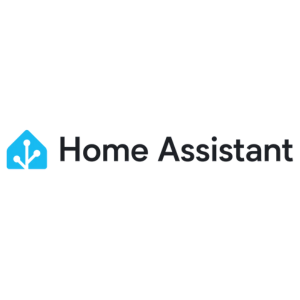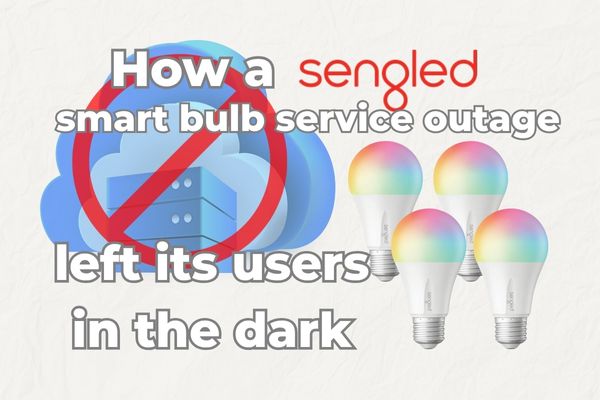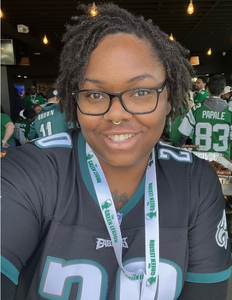How Sengled's Recent Outages Are Leaving Their Customers in the Dark
Sengled down again? Feeling frustrated, let down, and left in the dark by Sengled bulbs that won't connect, are unresponsive, or are experiencing an outage? Are you curious about cloud-free and local smart lighting alternatives? Check out the following guides here:
Updates:
As of Thursday, July 31, Sengled users are once again reporting that the app will not connect with its cloud service, and in some cases, Sengled bulbs are failing to connect with Alexa and Google Home. Sengled has not communicated with its users about its multiple major outages in the last several weeks, and there is speculation that Sengled is being sued for patent infringement.
As of Monday, June 23 at 6pm ET, it looks like Sengled's cloud services are back up though this hasn't been directly communicated by their company. If you'd like guidance on what to replace your Sengled Wi-Fi bulbs with, jump to our local control recommendations blog here. These are the same cloud-optional setups we use with clients every day to keep their smart home setups reliable, even when the internet isn't.
As of Sunday, June 22 at 3:30pm ET, Sengled customers confirmed on our Facebook page that their service is back up, but they are unhappy with Sengled's lack of communication on the matter.
As of Sunday, June 22 at 11am ET, some Redditors are reporting that Sengled's hub and services are back up, but there's still no official communication from Sengled on the matter.
Still in the Dark? Here’s How Sengled Customers Were Left Powerless
Imagine waking up to a house where the lights won’t respond, no matter how many times you ask Alexa. This scenario recently became a frustrating reality for many Sengled smart bulb users when a multi-day server outage left them literally in the dark. Here’s what went wrong, how users reacted, and why local control in smart home automation is crucial.

Folks taking to Reddit to see if others were experiencing a Sengled service outage
Why Were My Sengled Bulbs Not Responding to Alexa?
Sengled, a popular smart bulb manufacturer, faced a significant outage, starting around June 18, 2025 and ongoing for multiple days. Users reported on platforms like Facebook and Reddit that their Wi-Fi-dependent Sengled bulbs, controlled via the Sengled app, were completely unresponsive. The outage was severe enough that Amazon Alexa had to email users to clarify the issue was with Sengled, not Alexa itself. Users experienced scenarios like lights staying perpetually on, needing ladders to manually operate regularly-inaccessible bulbs, and an overall frustrating loss of control.

Amazon Alexa sending out an announcement about Sengled's outage
The key problem was Sengled’s reliance on cloud connectivity for their Wi-Fi bulbs. Unlike bulbs using local protocols, these Wi-Fi models require continuous access to Sengled’s servers. When these servers went down, homeowners’ bulbs became useless.
Our Sengled Bulbs Never Went Out Because I Avoided This Common Mistake
Interestingly, Sengled users employing local smart home control solutions experienced zero disruption. The Sengled bulbs in my office and demos are all Zigbee-based, integrated directly with my Home Assistant server. Throughout Sengled’s outage, my lights operated flawlessly because they weren’t dependent on Wi-Fi or external cloud servers.
Zigbee, a local wireless protocol, provides robust reliability by maintaining connectivity within its local mesh network. Meanwhile, smart home platforms like Home Assistant offer a unified, local management interface, ensuring your smart home functions independently of external cloud services. These solutions provide resilience against server outages, internet issues, or vendor-specific problems.
Learn more about the demo smart home system that flawlessly uses these Sengled Zigbee bulbs
What Can You Do Right Now If Your Sengled Bulbs Aren’t Working?
- Try turning them off and back on at the switch to force a reset
- If they’re not responding, the cloud service is likely down — not your fault, and unfortunately, not a lot you can do to change this until Sengled’s services come back online
- Consider switching to locally controlled bulbs or smart switches that still work during outages (like Zigbee with Home Assistant)

Download Now: 5 Simple Automations to Save Time & Lower Stress at Home
Why Your Smart Home Should Never Depend on Someone Else’s Server
The marketing messages of many smart home companies often oversimplify their technology. Advertisements highlight the ease of installation and seamless integration with platforms like Amazon Alexa and Google Home, creating an illusion of simplicity. However, the recent Sengled situation underscores some of these hidden complexities. Different brands and devices often rely on distinct apps, interfaces, and communication protocols, creating a fragmented and fragile system.
One recent client insight captures this challenge perfectly:
“Companies advertise smart home products as simple, but the reality is far more complex, as each device has its own app and setup.”
This complexity isn’t just a nuisance; it can become a major operational headache when issues arise.

Ready to Build a Smart Home You Actually Own?
Stop fighting with forums and YouTube tutorials. Get expert 1-on-1 guidance to set up your privacy-first Home Assistant system the right way, with proper security hardening, automation design, and troubleshooting confidence.
The Days of Cloud-Dependent Smart Lights Should Be Over - Here’s Why
The recent Sengled outage highlights a vital lesson: expert guidance matters in building a reliable smart home ecosystem. A professional smart home automation service provides more than just setup; the good ones will offer cohesive, unified management that significantly reduces technological complexity.
Instead of juggling multiple apps to control the basics of their environments, clients benefit from a single, streamlined interface tailored specifically to their lifestyle. A smart home expert ensures that diverse devices communicate seamlessly, reducing the risk of unexpected disruptions like Sengled’s recent outage.
3 Reasons Sengled’s Outage Proves Local Control is a Must-Have

Folks taking to Facebook to see if others were experiencing a Sengled service outage
To safeguard your home from future disruptions, consider the following:
- Prioritize local control: Opt for devices supporting Zigbee, Z-Wave, or other local protocols
- Unified Management: Utilize platforms like Home Assistant to centralize control
- Expert Consultation: Work with professionals who understand interoperability and can advise on resilient setups
Worried about Belkin shutting down its Wemo cloud control service? Check out our Wemo Shutdown Survival Guide ->
If Your Smart Lights Failed This Week, Here’s Exactly What Went Wrong
The Sengled server outage is a stark reminder of the risks associated with cloud-dependent smart home technology. By prioritizing local control and expert integration, you can enjoy the true promise of smart home automation: comfort, convenience, and reliability, and manage to avoid the next smart home cloud outage.
Ready to build a resilient smart home? Schedule your complimentary 30-minute discovery call and ensure you’re never left fumbling with unusable smart bulbs again.


